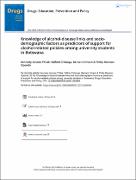| dc.contributor.author | Amone-P’Olak, Kennedy | |
| dc.contributor.author | Chilunga, Wilfred | |
| dc.contributor.author | Omech, Bernard | |
| dc.contributor.author | Renison Opondo, Phillip | |
| dc.date.accessioned | 2021-11-22T12:59:35Z | |
| dc.date.available | 2021-11-22T12:59:35Z | |
| dc.date.issued | 2019 | |
| dc.identifier.citation | Amone-P’Olak, K., Chilunga, W., Omech, B., & Opondo, P. R. (2020). Knowledge of alcohol-disease links and socio-demographic factors as predictors of support for alcohol-related policies among university students in Botswana. Drugs: Education, Prevention and Policy, 27(4), 320-327. | en_US |
| dc.identifier.uri | https://doi.org/10.1080/09687637.2019.1664994 | |
| dc.identifier.uri | https://hdl.handle.net/123456789/349 | |
| dc.description.abstract | Background: Worldwide, harmful alcohol use is causally related to about 60 diseases and is linked to
about 3.3 million deaths annually. Yet, awareness of alcohol-disease links is low.
Objective: This study aims to assess socio-demographic characteristics and knowledge of alcoholdisease
links as predictors of support for alcohol-related policies.
Methods: A survey of 615 university students (age¼19.8; SD¼1.6; 18–25) in Botswana assessed
alcohol use and knowledge of alcohol-disease links as predictors of support for alcohol-related policies.
T-tests and regression analyses were performed to estimate differences and predictors.
Results: Forty per cent of respondents (n¼245) use alcohol, 38% (n¼93) of whom were hazardous
users. Awareness of alcohol-disease links was low for diabetes (39%) and cancer (41%) but high for
liver cirrhosis (89%) and injuries (87%). Female gender (relative to male) (b¼0.19, 95% CI: 0.11, 0.27),
harmful alcohol use (b¼ 0.49, 95% CI: 0.56, 0.42), higher maternal education (b¼0.11, 95% CI:
0.02, 0.18), and more knowledge of alcohol-disease links (b¼0.13, 95% CI: 0.05, 0.21) predicted support
for policies.
Conclusions: Awareness of alcohol-disease links was low. Support for policies was predicted by being
female (relative to male), reporting no harmful alcohol use, having more educated mothers, and knowledge
of alcohol-disease links. Improving awareness of alcohol-disease links could be an effective intervention
to increase support for alcohol-related policies. | en_US |
| dc.publisher | Drugs: Education, Prevention and Policy | en_US |
| dc.subject | Diseases; alcohol policy; support; Botswana | en_US |
| dc.title | Knowledge of alcohol-disease links and sociodemographic factors as predictors of support for alcohol-related policies among university students in Botswana | en_US |
| dc.type | Article | en_US |

